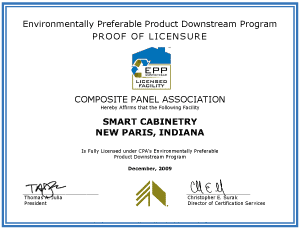EPP: Environmentally Preferable Product

Click HERE to download Certificate
Click HERE to download Consumer information
Click HERE to download Manufacturer information
Composite Wood Panels: Green by Nature!
By their very nature, composite wood panels are among the greenest building materials available to consumers. They are produced from pre– and post–consumer recycled wood and wood residuals that would otherwise be wasted or end up in landfills, making exceptional use of our valuable wood resource. They take less energy to make than other building materials and produce fewer harmful by–products. And, they can be reused or left to biodegrade naturally when their service life is done.
Consumer products made with composite wood panels are a great choice for environmentally–conscious consumers. But how can you be sure the finished products you’re buying are really green? Now, all you have to do is look for this seal. Only products carrying this seal are produced in a facility licensed under the new Composite Panel Association’s Environmentally Preferable Product Downstream Program.
What is the EPP Downstream Program?
CPA’s new EPP Downstream Program is an easy way for consumers to identify environmentally responsible products. Products carrying the EPP Downstream logo were manufactured by a company that has demonstrated their environmental commitment by purchasing at least 50% CPA EPPS 2–06 certified particleboard and MDF.
EPP Downstream Products: Good for You, Good for the Environment.
If you’re looking for assurance that the products you purchase are environmentally responsible, make sure you look for products that carry the EPP Downstream logo. By purchasing these products, you’ll be supporting one of the greenest industries on earth.
What are CPA EPPS 2–06 certified particleboard and MDF?
They’re composite wood panels that are certified as meeting the rigorous requirements of the CPA EPPS 2–06 environmental certification program, the most widely–specified environmental certification program for composite wood products in North America:
- It is the only environmental certification program that has achieved ANSI accreditation.
- Requires use of 100% recycled or recovered wood fiber.
- Requires 0.2 ppm or lower formaldehyde emissions.
- Requires ongoing participant testing of formaldehyde emissions.
- Requires monthly audits to verify recycled content, formaldehyde emissions, and adherence to QC procedures that meet ASTM protocol.
- Requires quarterly submission of samples for large chamber testing by accredited third party.
So when you specify and purchase EPP Downstream products, you can rest assured knowing that those products are manufactured to the highest environmental and quality standards.

